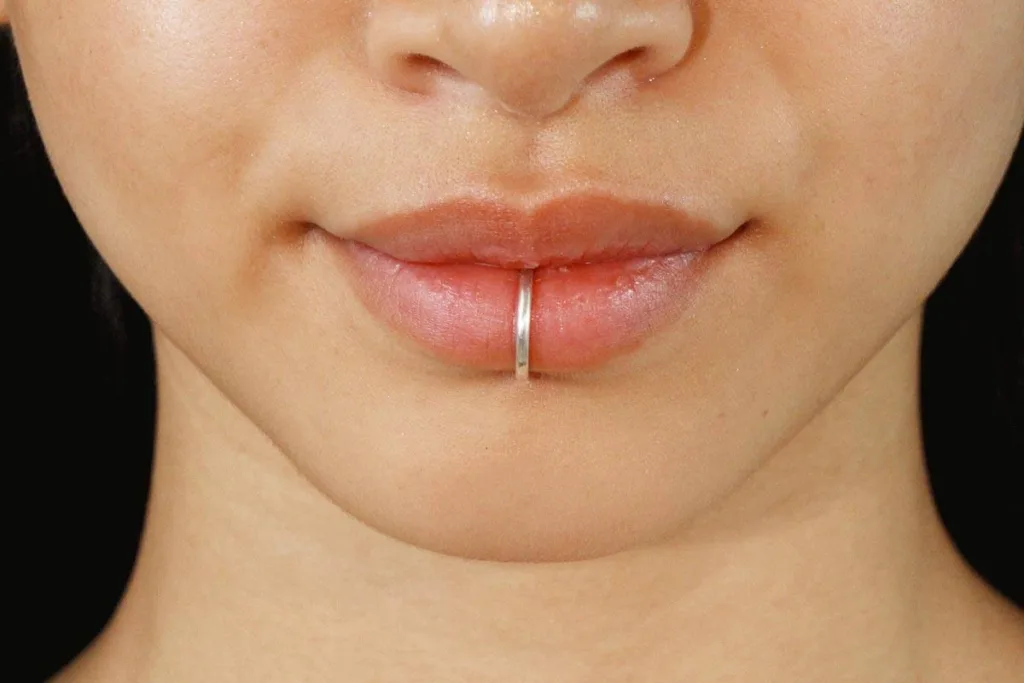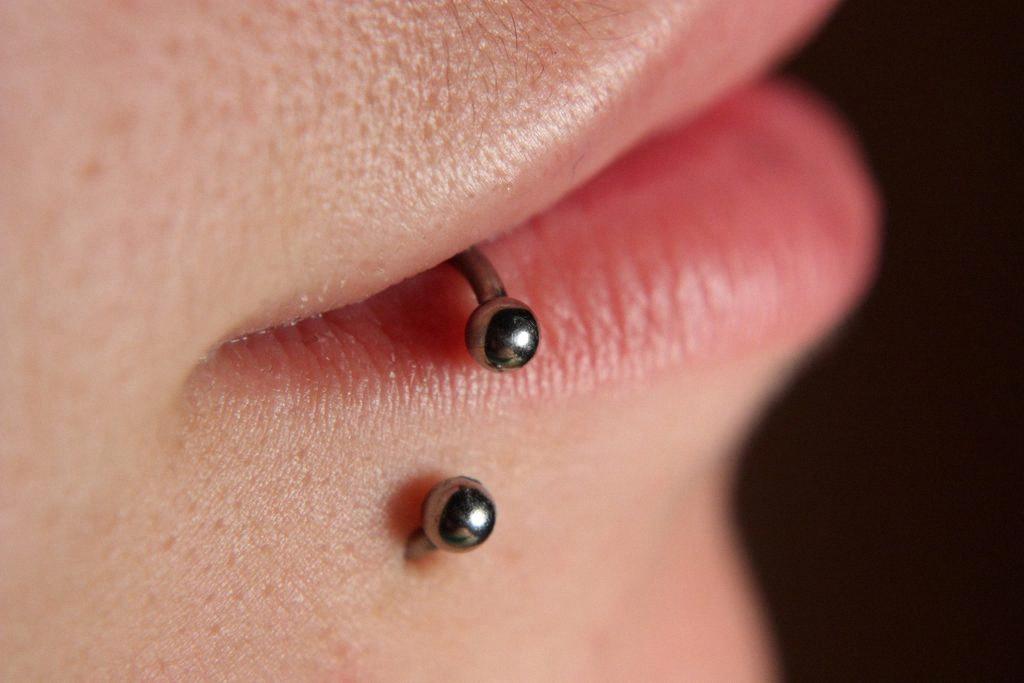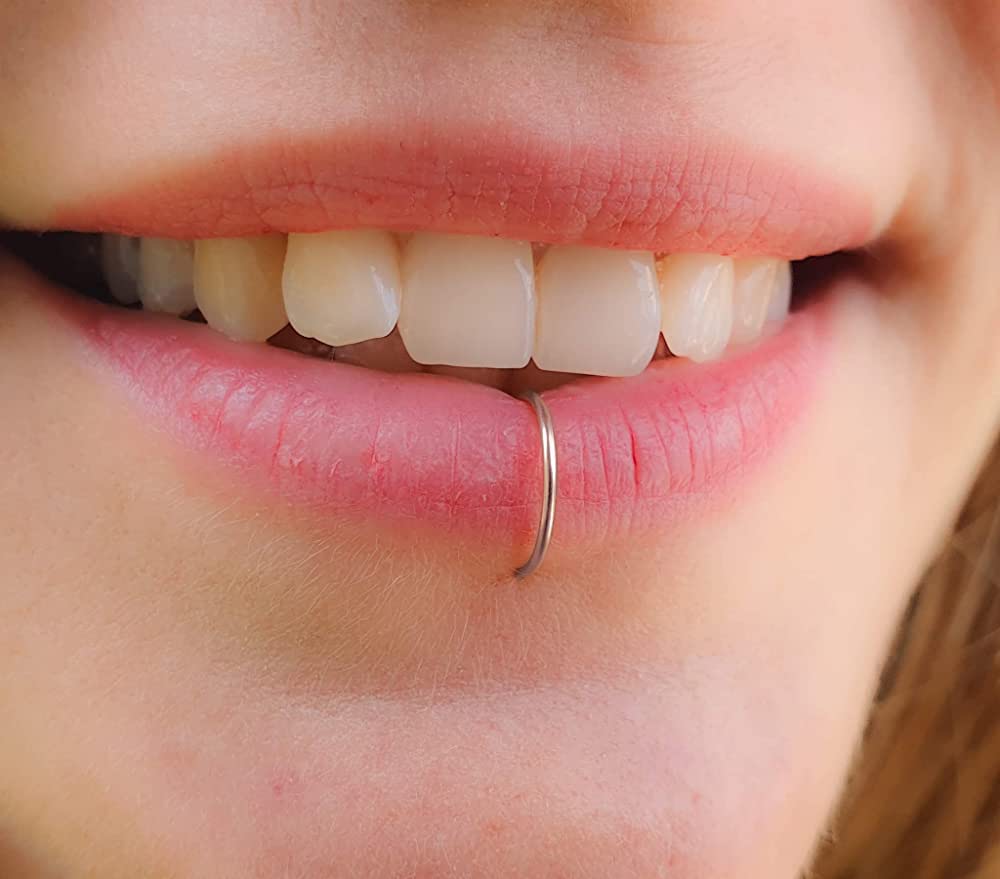Lip piercings are a popular form of body modification that involves piercing the upper or lower lip. While they can be a trendy and stylish addition to your look, many people are hesitant to get a lip piercing because they’re afraid it will hurt.
So, let’s get right to it – do lip piercings hurt? The answer is yes, but the level of pain varies from person to person. Most people who have had a lip piercing describe the pain as a 4 out of 10 on the pain scale.
One reason why the lip piercing can be more painful than other piercings is because the tissue around your mouth is sensitive and has a lot of nerve endings. However, the pain is usually short-lived and lasts only a few seconds.
It’s important to note that pain is subjective and what feels painful to one person may not feel the same to another. Some people may find the pain of a lip piercing to be more tolerable than, say, a nose piercing.
Now, let’s talk about the healing process. After getting a lip piercing, you can expect some swelling, tenderness, and discomfort for a few days. It’s important to follow proper aftercare instructions, such as cleaning the piercing with saline solution and avoiding certain foods and drinks that can irritate the piercing.
It’s also important to be gentle around the area that’s pierced, especially when kissing someone with a lip piercing. New piercings are especially sensitive, so take it slow and test your partner’s level of comfort before getting too aggressive.
If you’re relly concerned about the pain, you can ask your piercer about using a local anesthetic cream. However, it’s important to note that the cream may not penetrate deep enough into the lip to provide complete pain relief.
Lip piercings do hurt, but the level of pain varies from person to person. It’s important to follow proper aftercare instructions and be gentle around the piercing during the healing process. If you’re still unsure about getting a lip piercing, talk to your piercer and ask any questions you may have.
The Sensation of Getting a Lip Piercing
Getting a lip piercing can be a unique experience for everyone, but generally, it can feel like a sharp pinch or pressure. The sensation may be more intense than other piercings because the tissue around the mouth is dense with nerve endings and is generally more sensitive. You may feel some discomfort, swelling, or throbbing after the piercing, but this should subside wthin a few days. It’s essential to follow aftercare instructions carefully to ensure the healing process goes smoothly. Overall, the pain level and experience of getting a lip piercing can vary, but it’s essential to communicate with your piercer and be prepared for some discomfort.

The Impact of Lip Piercings on Kissing
Lip piercings can definitely cuse some discomfort while kissing, especially if the piercing is new. The level of pain or discomfort can vary from person to person, depending on factors such as the location of the piercing, the size of the jewelry, and the level of sensitivity of the individual. It’s important to be gentle around the area that’s pierced when kissing to avoid causing any pain or discomfort. Gently kissing the person around the piercing at first and testing their level of comfort before kissing them more aggressively is recommended. It’s also important to keep in mind that new piercings are especially sensitive and may require more care during kissing. Overall, communication with your partner about any discomfort or pain is crucial to ensure a comfortable and enjoyable experience for both parties involved.
Comparing the Pain of Lip and Nose Piercings
Both lip and nose piercings involve puncturing through cartilage, which can be more painful than piercing through skin. However, pain tolerance is subjective and can vary from person to person. Some people may find that lip piercings are more painful, while others may find that nose piercings are more uncomfortable. It is important to note that the pain associated with a piercing is usually brief and most people report that the discomfort is tolerable. Ultimately, choosing to get a piercing should be a personal decision based on individual preference and pain tolerance.
Can Numbing Agents Be Used Before a Lip Piercing?
Yes, it is possible to numb the area before getting a lip piercing. There are two common methods of numbing: topical anesthetic cream and local anesthesia injection.
Topical anesthetic cream is applied to the surface of the lip and left on for a specific amount of time to numb the area. It is important to follow the instructions carefully and not to apply excessive amounts of cream. This method is less invasive and less risky than local anesthesia injection, but it may not penetrate deep enough to provde complete pain relief.
Local anesthesia injection involves injecting a numbing agent directly into the area around the piercing. This method is more invasive and carries some risks, such as bleeding and infection. It requires a skilled professional to administer the injection safely.
It is important to discuss your options with your piercer and/or healthcare provider before getting a lip piercing. They can help you decide which method of numbing, if any, is right for you based on your individual needs and preferences.
The Disadvantages of Lip Piercing
Lip piercing comes with several potential risks and cons that should be considered before getting one. Firstly, bacterial infection is a common risk associated with lip piercing. The mouth contains millions of bacteria, and piercing the lip can create an open wound that is susceptible to infection. Secondly, lip piercing can cause damage to teeth and gums. It can cause tooth chipping or even fracture and gum recession. Thirdly, lip piercing can result in difficulty with speech, swallowing, chewing, and tasting. It may also cause discomfort while eating or drinking. Fourthly, an allergic reaction to the metal used for the piercing can occur, causing redness, swelling, and even scarring. Fifthly, nerve damage or prolonged bleeding can occur during the piercing process. Finally, gum disease is aother risk associated with lip piercing. The jewelry can trap bacteria, leading to inflammation and gum disease. Therefore, it is essential to weigh these potential risks before getting a lip piercing.

Source: kidsdentalonline.com
The Difficulty of Eating with a Lip Piercing
It is not necessarily hard to eat with a lip piercing, but it may take some getting used to. During the healing process, which can take several weeks to months, the area around the piercing may be tender and sensitive, leading to discomfort while eating. However, there are no specific dietary restrictions during this time, and you can eat any type of food that you normally would, as long as it doesn’t cause pain or discomfort. Some people may choose to avoid certain foods, such as very spicy or acidic foods, to minimize irritation. It’s important to maintain good oral hygiene and clean the piercing regularly to prevent infection and promote healing. After the healing process is complete, most people find that eating with a lip piercing is no dfferent than before.
Comparing the Pain of Lip and Ear Piercings
Yes, lip piercings generally hurt more than ear piercings. This is because the skin on and around the lips is more sensitive than the skin over the ears. The piercing process involves puncturing the skin, which can cause some discomfort for a few moments. However, the pain is usually tolerable and depends on individual pain thresholds. It is important to note that the pain subsides quickly, and the healing process is relatively fast. However, you may have to be extra careful while eating or drinking to avoid biting the piercing, which can cause further discomfort. Overall, lip piercings may cause more initial pain than ear piercings, but with proper care, the discomfort shuld subside quickly.
Kissing After Lip Piercing: How Long Should I Wait?
After getting a lip piercing, it is recommended to wait at least 3 weeks bfore engaging in any kissing or oral sex. This is because the piercing needs time to heal and any exchange of bodily fluids can increase the risk of infection. Additionally, it is important to avoid picking at any scabs that may form as they serve as a protective barrier against bacteria. It is best to wait for the scabs to fall away naturally to prevent unnecessary bleeding and potential infection. It is crucial to follow these precautions to ensure proper healing of the piercing and to prevent any complications.
Ranking Piercings from Most to Least Painful
The level of pain experienced during a piercing varies depending on the individual’s pain tolerance and the specific area being pierced. That being said, in general, piercings that involve cartilage or dense tissue tend to be more painful than those in fleshy areas. Based on this, the piercing that tends to be the most painful is the genital piercing, followed by nipple and cartilage piercings. Piercings in the nose, dermal, and navel areas tend to be less painful and are oftn described as a mild discomfort. Finally, the least painful piercing is typically the lobe piercing, which is often considered more of a quick pinch than a significant amount of pain. It’s important to note that the pain experienced during a piercing is subjective and can vary from person to person. It’s always recommended to do your research, choose an experienced piercer, and prepare yourself mentally and physically for the process.
Which Piercing Heals The Fastest?
Tongue piercings, without a doubt, have the fastest healing time of all piercings. Surprisingly, they only take two weeks to heal before you can downsize the bar. This is a reatively short amount of time compared to other piercings. For instance, lower lip piercings take a minimum of 6-8 weeks to heal, while upper lip piercings like madonna or monroe piercings require around 8 weeks. In conclusion, if you’re looking for a piercing that won’t take too long to heal, a tongue piercing might be the best option. However, it’s important to keep in mind that every person’s body is different, and healing times may vary.
What Not to Do With a New Lip Piercing
When you get a new lip piercing, it’s important to take proper care of it to ensure proper healing and prevent complications. There are several things you should avoid doing with a new lip piercing, including:
1. Avoid touching or playing with the piercing excessively. Doing so can cause trauma to the piercing site and delay healing.
2. Avoid using mouthwash that contains alcohol or hydrogen peroxide. These ingredients can be harsh on the piercing and irritate the skin, leading to complications.
3. Avoid eating spicy or acidic foods that can irritate the piercing site.
4. Avoid smoking or using tobacco products, as they can slow down the healing process and increase the risk of infection.
5. Avoid engaging in oral sexual contact, including wet kissing or oral sex, during the healing period. This can introduce bacteria to the piercing site and increase the risk of infection.
By following these guidelines, you can help ensure that your new lip piercing heals properly and without complications. If you have any concerns or questions about caring for your piercing, be sure to consult with a professional piercer or healthcare provider.
Sleeping with Lip Piercings In
It is generally not recommended to sleep with lip piercings in, as they can cause damage to your teeth or gums while you sleep. When you’re sleeping, you have less control over the movements of your mouth, and your piercings may come into contact with your teeth or gums more frequently or forcefully than they would during the day. This can lead to chipped or cracked teeth, gum irritation, or even infection. Additionally, sleeping on your side or stomach can put pressure on your piercings, which can cause them to become irritated or sore. For these reasons, it’s usualy best to remove your lip piercings before you go to bed. If you’re concerned about your piercing closing up, you can try using a retainer or a small piece of jewelry that won’t cause as much damage to your teeth or gums. However, it’s important to talk to your piercer or a dental professional to determine the best course of action for your specific situation.
The Risk of Nerve Damage from Lip Piercings
Yes, a lip piercing can hit a nerve. The nerves in the lips are quite close to the surface of the skin, so there is always a risk of hitting a nerve when gtting a lip piercing. If a nerve is hit during the piercing process or if the piercing is not placed correctly, it can cause nerve damage. This damage can affect movement and feeling in the lip, and in severe cases, it can even affect speech. It’s important to choose an experienced piercer who knows how to avoid hitting nerves and to follow proper aftercare instructions to reduce the risk of complications.

Conclusion
In conclusion, getting a lip piercing may caue some discomfort, but it is generally not reported to be extremely painful. The level of pain may vary from person to person, but most people rate the pain around a 4 on a scale of 1 to 10. This is because the tissue around the mouth is sensitive and has a higher concentration of nerve endings. However, the pain is usually short-lived and can be managed with proper aftercare. When kissing someone with a lip piercing, it’s important to be gentle and considerate of their sensitivity. Similarly, a nostril piercing may cause a brief sting that makes your eyes water and can make you sneeze. Overall, while lip piercings may cause some discomfort, they are a popular form of self-expression and can be a unique addition to one’s look.
